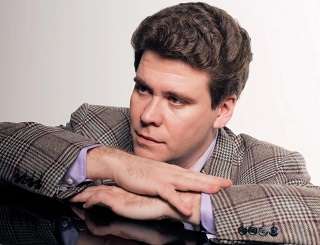|
Back
Showmanship and Little Else Montréal
Théâtre Maisonneuve, Place des Arts
05/05/2011 -
Franz Schubert: Piano Sonata in A minor, Op. post. 143, D. 784
Ludwig van Beethoven: Piano Sonata No. 23 in F minor, “Appassionata”, Op. 57
Franz Liszt: Mephisto Waltz No. 1
Sergei Rachmaninoff: Sonata No. 2 in B flat minor, Op. 36 (“revised version”)
Denis Matsuev (Piano)

D. Matsuev (© Courtesy of Théâtre Maisonneuve)
For his Canadian recital debut, Russian pianist Denis Matsuev chose a program of four Romantic masterpieces. For a little under two hours, Matsuev attacked the nine-foot grand and banged away as if it were his mortal enemy. His playing lacked color, shape, brilliance, direction, singing line and architecture. He alternated soft and loud in Schubert’s Piano Sonata in A minor, but failed to bring out the different colors and poetic intimacy. Nowhere did he evoke the “visions of paradise” mentioned in the program notes that impressed Alfred Einstein.
Beethoven’s Appassionata was all dark gray and muddiness with an overbearing left hand producing an unpleasant sonic boom. It lacked clarity and subtlety. The way he hammered out the arpeggios of the third movement was painful to the ears.
Liszt’s Mephisto Waltz No. 1 again lacked expressiveness and direction. The playing was meandering and unfocussed. It didn’t engage the listener and I couldn’t wait for it to end.
Rachmaninoff’s Sonata No. 2 in B flat minor concluded the formal part of the program. Although Matsuev managed to produce a poetic ambiance in the slow middle movement, he lost the melodic line in the final movement through a jumble of clashing and run-on notes.
Throughout the evening Matsuev failed to bring out the inner voices of the piano and to transmit any vision of the composers, let alone any he may have had himself. The best he could do was to produce as many notes in as little time as possible. This was a shame and a disappointment, particularly after his successful interpretation of the Rachmaninoff Third Concerto with Gergiev and the Mariinsky Orchestra here last year.
Matsuev gave an incredible six encores. This may have been due to the compulsion of Montreal audiences to give standing ovations to anything and everything. They were La Tabatière à musique (Liadov), Prelude in G sharp minor, Op. 32, No. 12 (Rachmaninoff), Etude in D sharp minor, Op. 8, No. 12 (Scriabin), Humoresque (Shchedrin), an arrangement of “In the Hall of the Mountain King” from Peer Gynt Suite No. 1 (Grieg), and a jazz improvisation of his own devising. He ended the first two with a soft, wispy touch intended to elicit sighs of pleasure and relief that audiences enjoy after listening to demanding pieces. This audience was not the usual subscription crowd; they were here because they truly wanted to be. They were quiet and respectful listeners. The encores were cleverly chosen to generate even more waves of applause. By the time of the third encore (the Scriabin), the audience was howling with delight. Up until the encores, Matsuev had shown no rapport with the audience, barely deigning to recognize them. He dashed onto and off the stage and didn’t even give the latecomers a chance to find their seats after the first number.
The concert was organized by Show One Productions of Toronto, which seems to specialize in Russian artists. They brought Matsuev with Vladimir Gergiev and the Mariinsky Orchestra to Montreal last year and will be bringing Gergiev and the Orchestra back this fall without a soloist.
The next morning the world learned that President Putin had named Matsuev “People’s Artist of Russia” for his “cultural achievement”. I can think of other Russian pianists of his generation (Lugansky and Kissin to name but two) who have impressed me more.
Earl Arthur Love
|